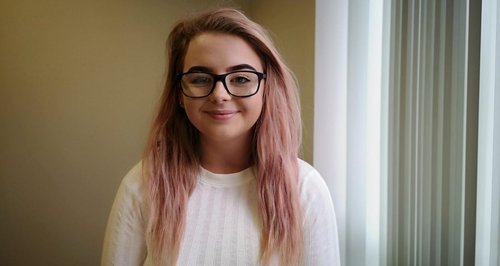On Air Now
Capital Breakfast with Jordan North, Chris Stark and Sian Welby 6am - 10am
11 April 2019, 07:00 | Updated: 11 April 2019, 07:07

A girl from Lancashire, who's struggled with anxiety and depression throughout her teenage years, wants there to be better mental health support offered to kids and teenagers.
Amy Fawcett was 13 when her mum started to worry about her mental health.
She went to see their local doctor in Lancaster, who was the first person to speak to Amy about her anxiety and depression.
Amy was referred to Child and Adolescent Mental Health Services (CAMHS) for an assessment:
"I think I was nervous about the fact that someone had turned around to me and gone 'yeah there's a problem'.
"I never really thought 'this isn't normal' - so to be told as a 13-year-old I was seeing a physciatrist, that was terrifying."
Amy was put on medication at her first appointment. She then regularly started seeing practitioners at CAMHS:
"I never really felt that they did anything in particular to help me. I'd go every week, they'd ask me how I feel, my answer would be the same every week about how I feel hopeless and rubbish, they'd then ask why and I'd never recognise why.
"I'm 19 now and I still can't tell anyone why I feel like this. They (CAMHS) used to say I must have a reason - they'd never accept that nothing in my life had happened for my mood to be set off."
Amy wanted extra help and feels like CAMHS didn't support her in the way she wanted them to.
By the time Amy reached 15, she'd been admitted to hospital twice for hurting herself and overdosing. She was given an inpatient bed and ended up staying for two weeks until she was told she needed to leave because there were no beds available for her anymore:
"I was still really struggling at this point in terms of my moods and the fact that I couldn't keep myself safe.
"My mum was told she was the one who needed to be responsible and keep me safe at home now.
"The CAMHS practioner actually turned around and just said 'you're going to have to cross your fingers and hope she keeps herself safe' - and that was how we were told to deal with me."
When Amy was close to turning 16, she was discharged from CAMHS because she'd reached the cut off age:
"There was no referral put into adult mental health so it was just a massive ledge to fall off from."
Amy eventually ended up becoming an inpatient at The Junction in Lancaster before being moved to The Cove in Heysham.
While Amy was staying in Heysham, she was granted day leave to attend the Ariana Grande concert in Manchester on May 22nd, 2017 - the day of the Manchester Arena bombing.
After the terror attack, Amy was disganosed with PTSD (post traumatic stress). She says she still feels left in the dark with it:
"Nearly two years on from the attack, I haven't had any interventions with my PTSD.
"Last year was the first anniversary {of the Manchester terror attack} and I knew I wasn't going to cope."
"There needs to be so much more done to help. There isn't services there for people to access and there's waiting lists.
"I know people who have been on the waiting list up to a year - by that point those feelings they had have doubled, tripled and spiraled. It's making people worse and giving them more problems."
CAMHS was contacted by Capital and a spokesperson issued this statement:
"We recognise the importance of ensuring timely mental health support is available for children and young people and ensure that this is put in place as soon as possible. Most children and young people who need to access the Trust's CAMHS services are seen for initial assessment within 18 weeks of referral in line with national targets. However, children and young people who are presenting with urgent needs are prioritised as needing urgent assessment and are seen much sooner than 18 weeks.
"Where longer waits are evident, we are working with commissioning colleagues to review funding and increase staffing where needed. We are also implementing a number of service improvements with the teams. We are committed to ensuring that we have a model in place that gives children and young people and their families access to a wide range of support when they most need it. Following receipt of referrals, families are advised that they can contact CAMHS teams if their situation changes, and appointments are expedited if children and young people are showing increased risk.
"Lancashire and South Cumbria NHS and voluntary/third sector providers are working together across a Care Partnership, with commissioners, key stakeholders and service users to re-design health funded children's mental health and emotional wellbeing services. This will develop services in line with Thrive principles to ensure service delivery that is responsive to presenting need. Additionally work is ongoing to increase the age range of CAMHS, improve the out of hours support available and ensure timely and appropriate access to services."